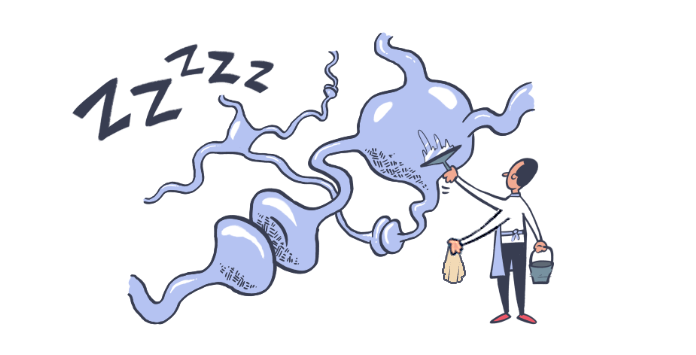Super sleepers, also known as ‘natural short sleepers’ or ‘elite sleepers,’ can somehow wake up feeling refreshed and fully functional on just 4-6 hours of sleep. Every. Single. Night.
Have you ever tried staying up way too late and then had to get up all too early, leaving very little time for precious sleep in between? For many of us, this results in a day filled with big yawns and excessive coffee consumption.
But did you know there is a small subset of individuals – estimated at just 1-3% of the population – for which this very short night’s sleep is not problematic at all.
Can 4-6 hours of sleep really be enough?
For super sleepers, yes. These people habitually sleep for a few hours less than the average human. Moreover, they show a clear preference for shorter sleep even when ample time is available. The super sleeper only needs 4-6 hours per night to accomplish what takes most of us 8 hours.
How do super sleepers do it?
Mutant genes are likely the ones to thank. In a series of scientific studies, researchers have now identified several specific genetic modifications that are associated with naturally short sleep durations (1).
One such genetic modification was a mutation in Metabotropic Glutamate Receptor 1 (GRM1). Researchers found this mutation by looking at the genes of people whose family members all showed natural short sleep behaviours. When this gene mutation was replicated in mice, the mutant mice also started sleeping for shorter durations (2).
Our understanding of how these mutant genes can dramatically alter sleep duration without affecting health continues to evolve. The current theory is that these genes alter the regulation of inhibitory and excitatory activity in the brain… but what does that mean?
Sleep allows our brain time to do the housekeeping – tidying up the waste, repairing, and reinforcing new connections created during the day. With super sleeper genes, there is either less waste to clean up in the first place or a super-efficient housekeeper.
A natural health advantage to be exploited
Even though poor sleep and sleep deprivation typically have been associated with a host of poor health outcomes, from chronic pain to metabolic syndrome and depression to Alzheimer’s disease, super sleepers escape this gloomy fate. A short sleep for a super sleeper is not the same as sleep deprivation, as super sleepers still accomplish all the necessary housekeeping tasks despite their shortened sleep window.
In fact, super sleepers tend to have lower body mass index and better general health than the average human. New research suggests that super sleepers may be protected from the very metabolic and neurodegenerative diseases in which lack of sleep is thought to play a major role (3).
Take Alzheimer’s, for example. When two of the genetic mutations associated with natural short sleep behaviour were replicated in mice, and these mice were then exposed to established Alzheimer’s disease models, the mutant mice developed less tau protein tangles and less amyloid plaques than non-mutant mice (3). Meaning: these mutant natural short sleeper genes made mice resilient to developing Alzheimer’s disease.
There is clearly great therapeutic and health potential to be unlocked in these natural short-sleeper genes.
So, super sleepers, what about the rest of us?
Until the therapeutic potential of natural short-sleeper genes can be harnessed and gene therapy becomes commonplace, the rest of us will probably have to settle for spending a few more hours beneath the sheets. Unfortunately, super sleeper behaviour cannot be learned, and if not a natural super sleeper, trying to survive on only 4-6 hours of sleep will likely result in declining health (1) .
More sleep is not always better
Much research has focused on defining the minimum amount of sleep needed for normal function and good overall health, making it sound like the more sleep you get, the better. However, much like sleep deprivation, long sleep durations are also associated with poor health. Like most biological behaviours, there’s a sweet spot for each of us.
For the majority, that sweet spot is probably between 7-9 hours per night.
Aim for sleep quality, not quantity
Super sleepers can doze for just 4-6 hours and wake up feeling refreshed, whereas others may sleep for 8-10 hours and still wake up dazed. The key is sleep quality.
So how can you improve the quality of your sleep?
Some quick tips include establishing a consistent bedtime, keeping your bedroom cool and dark, avoiding stimulants like caffeine and bright screens before going to sleep, and moving more during the day [4].
Following these tips might not transform you into a super sleeper, but they should help you find the optimum sleep pattern that enables you to function at your best every day.
References
- Yook J.H., Rizwan M., Shahid N., Naguit N., Jakkoju R., Laeeq S., Reghefaoui T., Zahoor H., & Mohammed L. (2021). Some Twist of Molecular Circuitry Fast Forwards Overnight Sleep Hours: A Systematic Review of Natural Short Sleepers’ Genes. Cureus, 13(10):e19045. https://doi.ord/10.7759/cureus.19045
- Shi G., Yin C., Fan Z., Xing L., Mostovoy Y., Kwok P., Ashbrook L.H., Krystal A.D., Ztácek L.J., & Fu Y. (2021). Mutations in Metabotropic Glutamate Receptor 1 contribute to natural short sleep trait. Current Biology, 31:13-24. https://doi.org/10.1016/j.cub.2020.09.071
- Dong Q., Gentry N.W., McMahon T., Yamazaki M., Benitez-Rivera L., Wang T., Gan L., Ptácek L.J., & Fu Y. (2022). Familial natural short sleep mutations reduce Alzheimer pathology in mice. Cell – iScience, 25(4):103964. https://doi.org/10.1016/j.isci.2022.103964
- Sleep Foundation (2022). Why do we sleep? Retrieved from: https://www.sleepfoundation.org/how-sleep-works/why-do-we-need-sleep


